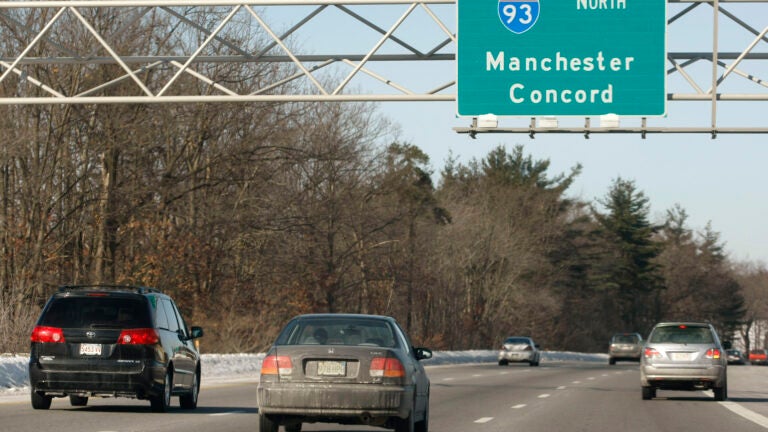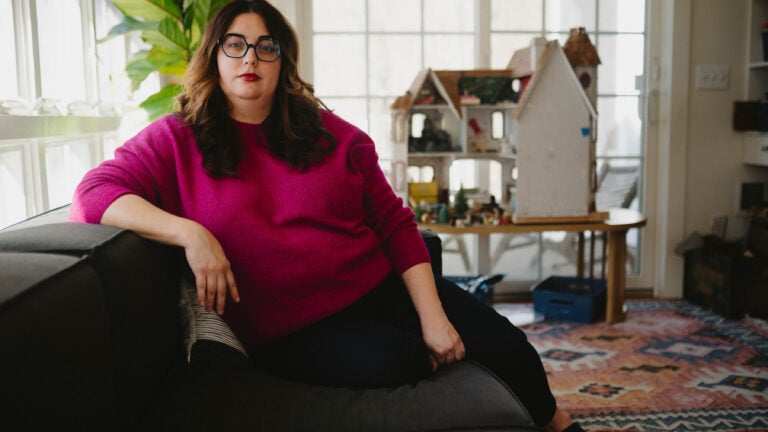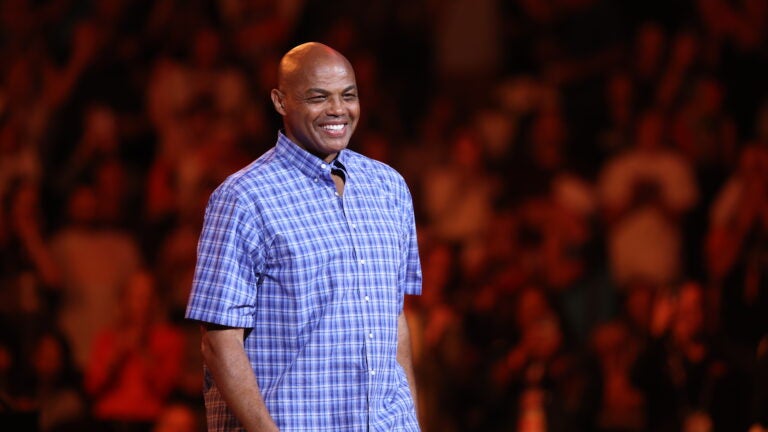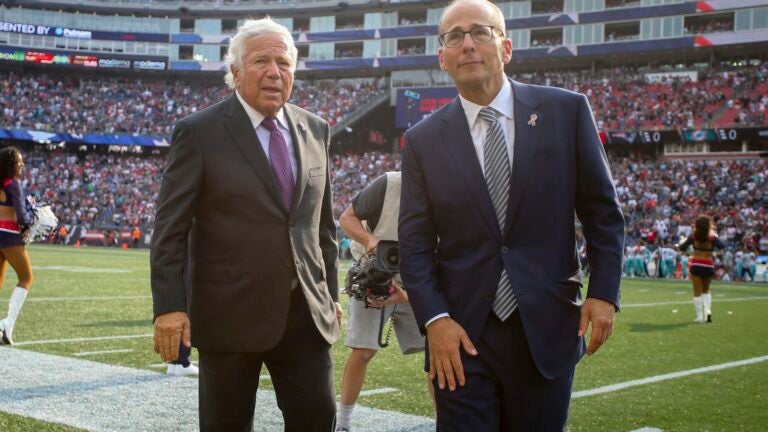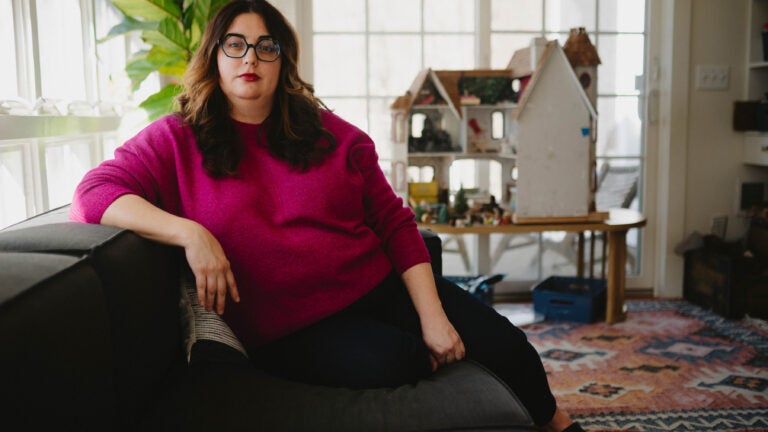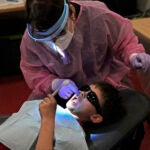Looking out for improperly discarded needles becomes routine for children and families in Boston
“The violence that we’re asking these kids to process is really unfair.”
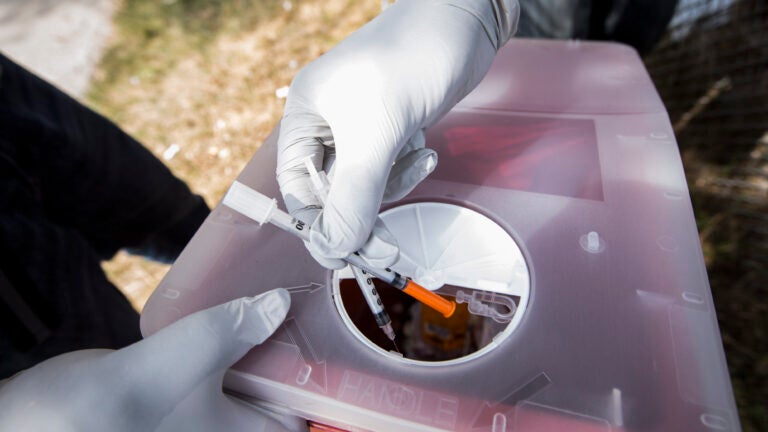
While music poured from speakers at Roxbury’s Orchard Park, heralding the start of a Little League event on a recent balmy Saturday, two parents talked about how they keep their kids safe while playing in the area.Not from the typical scrapes and bruises expected to occur during a softball game or a round of tag on the playground, but from discarded syringes, byproducts of the opioid epidemic
, swelling in the streets around them.
Before kids playing in the Roxbury Rookie League take the field for games and practices, a line search of the field is organized to look for the needles, a team parent said. At the neighboring Orchard Gardens Pilot School, parents keep an eye out for the discarded sharps around the school grounds when they drop off or pick up their children.
With the school’s proximity to “Methadone Mile,” the stretch of city blocks surrounding Mass. Ave. and Melnea Cass Boulevard dotted with shelters and recovery services for those struggling with substance use disorders and addiction issues, parents say their children witness daily the impacts of the epidemic, which leaves more than 130 people dead from overdoses each day nationally. Whether walking to school or gathering at parks — like Clifford Park — in the neighborhood, the kids may come across discarded needles in their path or see people actively shooting up and overdosing.
It’s been a problem for years. In 2017, Orchard Gardens students protested, demanding action from the school district and city to address the discarded needles around the school and on its property. A boy was pricked by a used syringe last November during recess, prompting a wave of public outcry with students and teachers holding a walkout in protest. Orchard Gardens United, a group of parents and community members, mobilized to call for change, at public meetings and online.
As a result, there are two needle disposal kiosks just over a 100 feet from the doors of the school and a fence is being constructed to prevent people from getting onto the grounds.
As the warm weather drives people outside for recreation, city agencies and community members alike say they are gearing up to deal with the discarded sharps in public spaces. But parents and community members say more still has to be done to protect the mental health, as well as the physical safety, of the children.
‘It’s causing a lot of mental distress on the kids within the city’

Jay’dha Rackard participates in a cleanup at the Orchard Gardens school, where she is a student.
On June 1st, a few dozen adults and kids gathered at Orchard Gardens to clean up the school grounds, an event organized by Orchard Gardens United.
Fifth-grader Jay’dha Rackard, who has been attending Orchard Gardens since Kindergarten, helped her mom, Janina Rackard, hand out trash bags and gloves to the volunteers.
She spoke about the problem of needles at a school committee meeting because she wants adults to keep her and her classmates safe, she said.
“Because if we’re not safe, then how can we learn?” she told Boston.com.
After the student was pricked in November, Jay’dha told her mom that she was scared to come to school.
Rackard said her 10-year-old daughter has trouble focusing and is afraid to walk in front of the school building. When they drive on the streets to and from the school, Jay’dha always insists her mother lock the car doors.
“It is affecting our children’s mental health,” Rackard said.
Soraya Harley said it’s frustrating for her to hear her two grandchildren, who attend the school, talk about how they watch where they’re walking, looking out for needles.
“They say, ‘Grandma, we’ve seen a needle. And when we see the needle, we tell someone. We were very scared,’” she said, pausing in her task of sweeping the concrete playground.
She and other parents said the students at Orchard Gardens are no longer allowed to use the neighboring park during school hours because of the risk of discarded syringes. Instead, they are limited to the fenced-in play area.
Rackard said she comes by the school in the evenings to check for needles, but that she and others find themselves in the position of asking people who are hanging around the school grounds, using drugs, to leave the area.
Gian Orsini, who lives down the street and whose son has been a student at the school for five years, said she started seeing more needles about three years ago and now spends almost every day looking for syringes near the school.
She wants the wider city community to understand that Orchard Gardens is a great school with committed educators.
“This is a really beautiful community of people, and these kids really do matter,” Orsini said. “And if this was happening in a different zip code, it wouldn’t be happening. To understand that the violence that we’re asking these kids to process is really unfair, between the dirt, the people here walking around who are intoxicated on different things, it’s just not fair and we shouldn’t just accept it because we’re near Methadone Mile. It’s not acceptable.”
She gestured to the parents and kids around her picking up trash and dragging rakes around the school grounds.
“Parents don’t want to be out here picking up needles, we want to be fighting for enrichment, we want to be having field trips, we want to be having cookouts, we want to be having fun things,” Orsini said. “And this is good, I’m glad that we’re doing it, but we shouldn’t be, but we’re getting tied up with basic safety needs that really shouldn’t be part of what parents should be demanding.”
‘It’s not like they just see it far away. It’s here.’

A kiosk for collecting discarded needles in Orchard Park, near the Orchard Gardens school.
Parents at the school cleanup said the kiosks, marked by biohazard symbols, are too close to the school, arguing that the bins should not be in the view of the school children.
A teacher at Orchard Gardens, who asked to remain anonymous, said that while the wider community might know there’s an opioid crisis happening in the city, she doesn’t think there’s an understanding of what her students face.
Once during recess, she said she and her colleagues heard young students talking about “taking medicine.” The children had discovered drug capsules, left scattered under the play structure.
“I don’t think people realize how close to home it is for so many kids, the school has over 900 students, and the middle schoolers have to walk here or take public transportation,” she said. “That means that they’re walking by the tents that are set up outside, they’re walking past the needles on the ground. They’re getting here early and seeing people sleeping against the building. I don’t think people realize just how much it impacts kids on a daily basis. It’s not like they just see it far away. It’s here.”

Domingos DaRosa and Janina Rackard.
The hardest thing to see, she said, is that for her students, the impacts of the crisis are becoming normalized.
“That in itself is a huge issue,” she said. “And the fact that they don’t feel like people care, hurts my heart. I want them to know that we care about them, but it’s not being demonstrated in terms of their safety.”
Domingos DaRosa, who runs the Boston Bengals Pop Warner program out of Clifford Park, said witnessing an overdose, as his players and children did at the park in May, is a “lifelong trauma” for kids.
His 10-year-old daughter has nightmares about getting stuck by needles, he said.
“We want to see these people get services,” he said. “We want to see them get the attention they need so that they can better themselves. But at the same time, we’re the collateral damage. We’re the ones who, once again, have to take the brunt of it. We have to sit back and explain to our children things that 5 and 6-year-olds shouldn’t have to experience.”
DaRosa, who is running for an at-large position on the Boston City Council, spends several hours a week walking around the area, scanning Clifford Park and around the schools for needles. He’s taught his players, some as young as 5, how to do a line search of the field at Clifford Park.
“It’s causing a lot of mental distress on the kids within the city,” DaRosa said. “Because it’s not just happening in Lower Roxbury, it’s spread to every corner of this city.”
‘We’ve never seen anything like this before’

A discarded needle lays in the grass near the sidewalk outside of Orchard Gardens along Melnea Cass Boulevard in 2018.
At Orchard Gardens, the school district is installing new fencing to try and prevent trespassing on the property, a process which is partially complete.
“The problem of discarded needles being discovered in public areas within the City, particularly in the area surrounding Orchard Gardens K-8 School in Roxbury, is one that the Boston Public Schools (BPS) takes very seriously,” the district said in a statement. “The growing scope of this safety concern has required additional steps be taken to protect the Orchard Gardens K-8 School community as well as the Mason School community.”
Those steps include training for school staff, “age-appropriate” lessons on the dangers of needles for the students, and custodians checking the grounds at least three times a day.
Police, the parks department, and the Boston Public Health Commission’s Mobile Sharps Team are paying extra attention to the area with scheduled patrols, maintenance, and sweeps. The sharps team, started in 2015 as a two-person unit, responds to reports of discarded syringes through the city’s 311 service, but it also has established routes in areas known to be “high traffic.”
Sarah Mackin, director of AHOPE, the city’s needle exchange and harm reduction services, said there is no shortage of work for the team, which is now comprised of four full-time employees, who pick up sharps 12 hours a day, seven days a week.
“We’ve been doing this long enough that we know where there are really high traffic areas, we know where there are a lot of discarded syringes and where there’s a lot of active drug use,” she said.
Mackin said the team works closely with the schools near Boston Medical Center, including Orchard Gardens, to ensure that sweeps take place before kids arrive each morning, and will continue to do so for summer programming. Any reports that come in of needles near schools, playgrounds, or parks — where families or kids are using a public space — get top priority. Each time they respond to a specific report of a needle, sharps team members will search the surrounding area as well.
In addition to the dedicated sharps team members, Mackin said 10 to 15 outreach workers will collect needles when they’re out in the community, doing sweeps and talking to people on the streets.
The team runs the data from 311 reports on a weekly basis to monitor if new “hot spots” pop up that can be incorporated into the daily sweeps.
“We can’t just be reactive, we have to be proactive,” Mackin said.
As of the end of May, 216 reports of discarded needles in Roxbury had been made to 311 this year. During the same time period, 212 needles were reported in the South End.
The combined number of syringes collected by the sharps team, dropped off in one of the city’s eight disposal kiosks, or brought into the needle exchange ranges between 12,000 and 16,000 a week, according to the commission.
Mackin said the rising pervasiveness of fentanyl, which causes people to inject more frequently throughout the day, has heightened the probability that syringes will be left in public areas.
“We’re in the midst of a crisis, and we have to work together,” she said.
Each week, the program ends up collecting more syringes than are given out at the needle exchange, Mackin said. That’s because pharmacies are able to sell the needles over the counter without a prescription, but don’t offer a method for disposal of sharps.
“The reality is that we are not only taking responsibility for the syringes that we give out, we’re taking responsibility for any syringes found in a public way,” she said.
Boston City Councilor Annissa Essaibi-George has filed an ordinance for consideration that would require pharmacies to take back needles in the city, which would bring the total number of syringe disposal locations to more than 100, she told Boston.com. She said she anticipates the ordinance would be enacted sometime in 2020.
With 600,000 needles collected by the city in 2018, Essaibi-George said everyone needs to be involved in cleanups and resources need to be increased. The city’s budget for the 2020 fiscal year includes more funding for needle cleanup efforts and 10 new disposal kiosks.
“This is a very unfortunate reality that our kids across the city are dealing with, and unfortunately Orchard Gardens — and that immediate neighborhood — have become ground zero for the habits that the opioid crisis has caused on our city and our region,” Essaibi-George told Boston.com.
If you come across a discarded needle, Mackin said to be as specific as possible about its location, and take a picture if you can, when you report it through 311.
“The more specific you can be, the better,” she said.
The ongoing work of addressing discarded syringes will require “a lot of attention and a lot of resources” in coordinated community response, given the scope of the opioid epidemic, Mackin said. Officials are also looking into a broader strategy beyond just picking up needles to address discarded syringes, which includes training for city staff in other departments, like parks and recreation, for how to safely collect and dispose of the sharps.
“I don’t think any of us anticipated the breadth and the scope of the opioid crisis,” she said. “So we’re hoping that things get better, but there’s really no way to tell.”
The cleanup at Orchard Gardens didn’t yield the discovery of any needles on the playground, though a few were found across the street from the school. But when DaRosa went to throw away trash in the school dumpster, accompanied by a few kids, he noticed a man on the ground beside the bin.
As he got closer and saw a needle, he told the kids to go back to the cleanup, to send another adult. Then he called 911.
